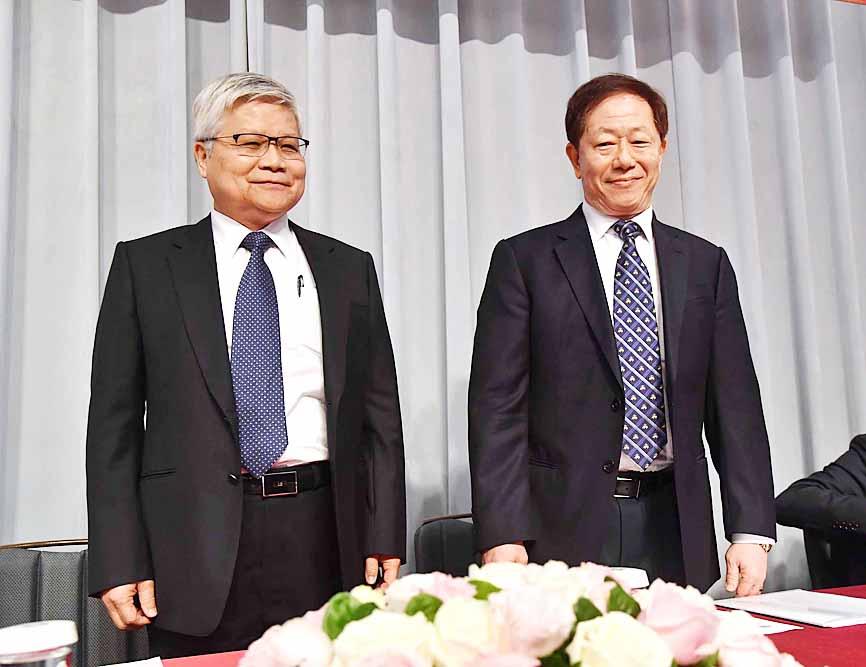Taiwan Semiconductor Manufacturing Co (TSMC, 台積電) chairman Mark Liu (劉德音) and chief executive officer C.C. Wei (魏哲家) each received about NT$422 million (US$14.89 million) in compensation last year, when the contract chipmaker’s net profit smashed records.
Liu’s and Wei’s pay rose NT$129 million, or 44 percent, from a year earlier, as the chipmaker reported a nearly 50 percent year-on-year increase in net income to NT$517.89 billion last year, TSMC said in its annual report.
Earnings per share were NT$19.97, a significant increase from NT$13.32 a year earlier, as the company benefited from global demand for its high-end 5-nanometer and 7-nanometer process chips used in emerging technologies such as 5G applications, high-performance computing devices and the Internet of Things.

Photo: CNA
Consolidated sales for last year also reached a record NT$1.34 trillion, up from NT$1.07 trillion a year earlier. In US dollar terms, sales rose 31.4 percent from a year earlier, beating the average growth of 10 percent in the global semiconductor industry.
The company shipped 12.4 million 12-inch-equivalent wafers, up from 10.1 million units in 2019, while sales of chips made using a 16-nanometer process and more advanced technologies, including the 5 and 7-nanometer processes, accounted for 58 percent of the company’s total sales, up from 50 percent a year earlier, the annual report showed.
Last year, the company provided 281 different production technologies to its 510 customers and rolled out 11,617 products, it said.
The company accounted for 24 percent of total production value in the global semiconductor industry, excluding the memorychip segment, up from 21 percent in 2019, it said.
In the report, Liu and Wei thanked shareholders for their support and trust in the company.
Several other TSMC executives received annual compensation topping NT$100 million last year, the report showed.
These executives included senior vice president of Europe and Asia sales Lora Ho (何麗梅), senior vice president of operations Y.P. Chin (秦永沛), senior vice president of research and development Y.J. Mii (米玉傑), senior vice president of information technology, materials and risk management J.K. Lin (林錦坤) and senior vice president of research and development Lo Wei-jen (羅唯仁).
Chief financial officer Wendell Huang (黃仁昭), senior vice president of corporate planning J.K. Wang (王建光), senior vice president of Europe and Asia sales and corporate research under research and development Cliff Hou (侯永清), senior vice president of business development Kevin Zhang (張曉強) and vice president and general counsel Sylvia Fang (方淑華) each received compensation of NT$50 million to NT$100 million, TSMC said.

MULTIFACETED: A task force has analyzed possible scenarios and created responses to assist domestic industries in dealing with US tariffs, the economics minister said The Executive Yuan is tomorrow to announce countermeasures to US President Donald Trump’s planned reciprocal tariffs, although the details of the plan would not be made public until Monday next week, Minister of Economic Affairs J.W. Kuo (郭智輝) said yesterday. The Cabinet established an economic and trade task force in November last year to deal with US trade and tariff related issues, Kuo told reporters outside the legislature in Taipei. The task force has been analyzing and evaluating all kinds of scenarios to identify suitable responses and determine how best to assist domestic industries in managing the effects of Trump’s tariffs, he

TIGHT-LIPPED: UMC said it had no merger plans at the moment, after Nikkei Asia reported that the firm and GlobalFoundries were considering restarting merger talks United Microelectronics Corp (UMC, 聯電), the world’s No. 4 contract chipmaker, yesterday launched a new US$5 billion 12-inch chip factory in Singapore as part of its latest effort to diversify its manufacturing footprint amid growing geopolitical risks. The new factory, adjacent to UMC’s existing Singapore fab in the Pasir Res Wafer Fab Park, is scheduled to enter volume production next year, utilizing mature 22-nanometer and 28-nanometer process technologies, UMC said in a statement. The company plans to invest US$5 billion during the first phase of the new fab, which would have an installed capacity of 30,000 12-inch wafers per month, it said. The

Taiwan’s official purchasing managers’ index (PMI) last month rose 0.2 percentage points to 54.2, in a second consecutive month of expansion, thanks to front-loading demand intended to avoid potential US tariff hikes, the Chung-Hua Institution for Economic Research (CIER, 中華經濟研究院) said yesterday. While short-term demand appeared robust, uncertainties rose due to US President Donald Trump’s unpredictable trade policy, CIER president Lien Hsien-ming (連賢明) told a news conference in Taipei. Taiwan’s economy this year would be characterized by high-level fluctuations and the volatility would be wilder than most expect, Lien said Demand for electronics, particularly semiconductors, continues to benefit from US technology giants’ effort

‘SWASTICAR’: Tesla CEO Elon Musk’s close association with Donald Trump has prompted opponents to brand him a ‘Nazi’ and resulted in a dramatic drop in sales Demonstrators descended on Tesla Inc dealerships across the US, and in Europe and Canada on Saturday to protest company chief Elon Musk, who has amassed extraordinary power as a top adviser to US President Donald Trump. Waving signs with messages such as “Musk is stealing our money” and “Reclaim our country,” the protests largely took place peacefully following fiery episodes of vandalism on Tesla vehicles, dealerships and other facilities in recent weeks that US officials have denounced as terrorism. Hundreds rallied on Saturday outside the Tesla dealership in Manhattan. Some blasted Musk, the world’s richest man, while others demanded the shuttering of his